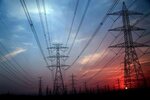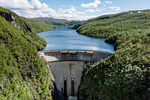News Release from Siemens Gamesa Renewable Energy
Wind Industry Profile of
10/18/2011
USA - Deepwater Wind signs wind power agreement with Siemens
The Deepwater Wind Energy Center is expected to site 200 wind turbines in the waters of southern Rhode Island Sound. Construction is planned for 2014 or 2015, with operation expected by 2016 or 2017.
Deepwater plans 1GW offshore wind farm. Deepwater Wind has submitted plans to develop a utility-scale offshore wind farm off the coast of Rhode Island and Massachusetts. The company said the Deepwater Wind Energy Centre project will be the first of the “second generation” offshore wind farms. Rhode Island firm submits offshore wind farm proposal. Deepwater Wind has submitted a plan to develop an offshore wind farm. The 1,000-megawatt wind power project would be located between Block Island and Martha’s Vineyard and would boast as many as 200 wind turbines.
Deepwater Wind announced Friday that it filed its required application with the federal government this week. The 1,000-megawatt wind power project would be located between Block Island and Martha’s Vineyard and would boast as many as 200 wind turbines. If federal regulators approve the proposal, Deepwater’s wind turbines could be operational by 2017. Deepwater says the wind turbines will be “barely visible’’ from land.
The wind power company plans to base its manufacturing operations at Quonset Point. State officials hope the wind energy project will translate into new jobs. Federal officials announced in August that they were seeking formal proposals for wind energy projects off the Rhode Island coast.
Deepwater Wind this week officially submitted its plan to develop a utility-scale offshore wind farm off the coasts of Rhode Island and Massachusetts, in response to the U.S. Department of the Interior’s Bureau of Ocean Energy Management Regulation and Enforcement (BOEMRE)’s Call for Information and Nominations for offshore wind energy projects in the federal ocean waters off southern New England.
Deepwater Wind’s project – the Deepwater Wind Energy Center (DWEC) – will be the first of the “second generation” of offshore wind farms in the United States. With a capacity of approximately 1,000 megawatts, DWEC will serve as a regional offshore wind energy center serving multiple states on the East Coast.
“The Deepwater Wind Energy Center is poised to be the first regional offshore wind energy center in the United States with a wind farm and a transmission system serving multiple markets,” said William M. Moore, Deepwater Wind CEO.
DWEC will be sited in the deep ocean waters of southern Rhode Island Sound, where it will be barely visible from the shore. Construction is planned to begin in 2014 or 2015, with the first wind turbines in operation by the end of 2016 or 2017.
With as many as 200 wind turbines, DWEC will be the largest offshore wind farm ever planned in the United States. Because of the economies of scale gained by building a large facility and because of the continuing maturity of the offshore wind industry, DWEC’s power price will also be lower than earlier offshore wind projects proposed in the U.S. DWEC will demonstrate that as the offshore wind industry continues to mature, its energy prices will become increasingly competitive with plants that burn fossil fuels – but without the environmental problems that plague fossil fuel plants.
“This ‘second generation’ of offshore wind farms will be larger and farther from shore, and will produce lower priced power, using more advanced technology than any of the offshore projects announced to date,” Moore said.
Deepwater Wind previously filed an unsolicited nomination to BOEMRE to lease the ocean site where it plans to locate DWEC. Since then, Deepwater Wind, after consultations with area fishing groups and other stakeholders, has refined the ocean lease blocks it has nominated in order to accommodate multiple different project designs. At this early stage of project development, Deepwater Wind believes that additional input from key stakeholders, such as commercial fishers, should be considered before final project siting is determined. Deepwater Wind’s lease block nomination creates this flexibility by including enough area for different project configurations.
Deepwater Wind is also developing a regional offshore transmission network, the New England-Long Island Interconnector (NELI), connecting DWEC to southern New England and eastern Long Island. NELI will allow the wind farm to send power to multiple states in the region. Deepwater Wind plans to market power from DWEC to several states, including Massachusetts, Rhode Island, New York, and Connecticut.
Most of the turbines will be located 20 – 25 miles from shore. No turbine will be located any closer than 13.8 miles from inhabited land, with only a few turbines located at that distance. At these distances, the wind farm will be barely visible from the shore and the project site can take advantage of the stronger winds found in the open ocean.
Deepwater Wind’s proposal sites DWEC in the “Area of Mutual Interest” between the states of Rhode Island and Massachusetts. As a result of a competitive bid process held by the State of Rhode Island in 2008, Deepwater Wind is the state’s preferred developer in this Area of Mutual Interest. The utility-scale project is also outlined in the Joint Development Agreement between Deepwater Wind and Rhode Island.
Deepwater Wind will base its manufacturing and construction operations at Quonset Point, in Rhode Island, where the company has over 100 acres under lease option. Deepwater Wind is also exploring port and other facilities in Massachusetts to compliment its Quonset base.
As a 1,000 MW regional offshore wind energy center, DWEC is a first-of-its-kind project in several ways and serves as a model for future Deepwater Wind projects. First, it is the largest renewable energy project ever proposed for the northeast United States.
“Energy independence for our nation is possible only by taking bold steps to wean ourselves off of our addiction to fossil fuels,” Moore said. “Second generation utility-scale wind farms like DWEC can significantly reduce our need to burn fossil fuels, improve local air quality, and reduce greenhouse gas emissions – problems that are especially acute in the densely-populated Northeast.”
Second, the projected pricing of the power from DWEC is expected to be lower than that proposed for any offshore wind farm ever planned in the United States. The wholesale price of power depends on the final size of the project, the final configuration of the transmission system, and the continued availability of federal tax incentives, however Deepwater Wind expects the pricing on a kilowatt-hour basis to be in the mid-teens (measured in cents). DWEC will demonstrate that offshore wind is becoming increasingly competitive with fossil fuel plants.
Third, at 1,000 MWs, DWEC may entice both domestic and foreign suppliers to seriously consider establishing significant parts of their fabrication, manufacturing, assembly, and support services in Rhode Island and Massachusetts. According to the Memorandum of Understanding between those two states, they will coordinate economic development to maximize job creation in the region. Before DWEC, the United States market was seen as underdeveloped and not large enough to justify a new manufacturing base for suppliers of components such as turbines and blades.
BOEMRE will review Deepwater Wind’s lease request in consultation with taskforces organized at the state level in Rhode Island and Massachusetts.
For more information on this article or if you would like to know more about what www.windfair.net can offer, please do not hesitate to contact Trevor Sievert at ts@windfair.net
www.windfair.net is the largest international B2B Internet platform – ultimately designed for connecting wind energy enthusiasts and companies across the globe!
Deepwater plans 1GW offshore wind farm. Deepwater Wind has submitted plans to develop a utility-scale offshore wind farm off the coast of Rhode Island and Massachusetts. The company said the Deepwater Wind Energy Centre project will be the first of the “second generation” offshore wind farms. Rhode Island firm submits offshore wind farm proposal. Deepwater Wind has submitted a plan to develop an offshore wind farm. The 1,000-megawatt wind power project would be located between Block Island and Martha’s Vineyard and would boast as many as 200 wind turbines.
Deepwater Wind announced Friday that it filed its required application with the federal government this week. The 1,000-megawatt wind power project would be located between Block Island and Martha’s Vineyard and would boast as many as 200 wind turbines. If federal regulators approve the proposal, Deepwater’s wind turbines could be operational by 2017. Deepwater says the wind turbines will be “barely visible’’ from land.
The wind power company plans to base its manufacturing operations at Quonset Point. State officials hope the wind energy project will translate into new jobs. Federal officials announced in August that they were seeking formal proposals for wind energy projects off the Rhode Island coast.
Deepwater Wind this week officially submitted its plan to develop a utility-scale offshore wind farm off the coasts of Rhode Island and Massachusetts, in response to the U.S. Department of the Interior’s Bureau of Ocean Energy Management Regulation and Enforcement (BOEMRE)’s Call for Information and Nominations for offshore wind energy projects in the federal ocean waters off southern New England.
Deepwater Wind’s project – the Deepwater Wind Energy Center (DWEC) – will be the first of the “second generation” of offshore wind farms in the United States. With a capacity of approximately 1,000 megawatts, DWEC will serve as a regional offshore wind energy center serving multiple states on the East Coast.
“The Deepwater Wind Energy Center is poised to be the first regional offshore wind energy center in the United States with a wind farm and a transmission system serving multiple markets,” said William M. Moore, Deepwater Wind CEO.
DWEC will be sited in the deep ocean waters of southern Rhode Island Sound, where it will be barely visible from the shore. Construction is planned to begin in 2014 or 2015, with the first wind turbines in operation by the end of 2016 or 2017.
With as many as 200 wind turbines, DWEC will be the largest offshore wind farm ever planned in the United States. Because of the economies of scale gained by building a large facility and because of the continuing maturity of the offshore wind industry, DWEC’s power price will also be lower than earlier offshore wind projects proposed in the U.S. DWEC will demonstrate that as the offshore wind industry continues to mature, its energy prices will become increasingly competitive with plants that burn fossil fuels – but without the environmental problems that plague fossil fuel plants.
“This ‘second generation’ of offshore wind farms will be larger and farther from shore, and will produce lower priced power, using more advanced technology than any of the offshore projects announced to date,” Moore said.
Deepwater Wind previously filed an unsolicited nomination to BOEMRE to lease the ocean site where it plans to locate DWEC. Since then, Deepwater Wind, after consultations with area fishing groups and other stakeholders, has refined the ocean lease blocks it has nominated in order to accommodate multiple different project designs. At this early stage of project development, Deepwater Wind believes that additional input from key stakeholders, such as commercial fishers, should be considered before final project siting is determined. Deepwater Wind’s lease block nomination creates this flexibility by including enough area for different project configurations.
Deepwater Wind is also developing a regional offshore transmission network, the New England-Long Island Interconnector (NELI), connecting DWEC to southern New England and eastern Long Island. NELI will allow the wind farm to send power to multiple states in the region. Deepwater Wind plans to market power from DWEC to several states, including Massachusetts, Rhode Island, New York, and Connecticut.
Most of the turbines will be located 20 – 25 miles from shore. No turbine will be located any closer than 13.8 miles from inhabited land, with only a few turbines located at that distance. At these distances, the wind farm will be barely visible from the shore and the project site can take advantage of the stronger winds found in the open ocean.
Deepwater Wind’s proposal sites DWEC in the “Area of Mutual Interest” between the states of Rhode Island and Massachusetts. As a result of a competitive bid process held by the State of Rhode Island in 2008, Deepwater Wind is the state’s preferred developer in this Area of Mutual Interest. The utility-scale project is also outlined in the Joint Development Agreement between Deepwater Wind and Rhode Island.
Deepwater Wind will base its manufacturing and construction operations at Quonset Point, in Rhode Island, where the company has over 100 acres under lease option. Deepwater Wind is also exploring port and other facilities in Massachusetts to compliment its Quonset base.
As a 1,000 MW regional offshore wind energy center, DWEC is a first-of-its-kind project in several ways and serves as a model for future Deepwater Wind projects. First, it is the largest renewable energy project ever proposed for the northeast United States.
“Energy independence for our nation is possible only by taking bold steps to wean ourselves off of our addiction to fossil fuels,” Moore said. “Second generation utility-scale wind farms like DWEC can significantly reduce our need to burn fossil fuels, improve local air quality, and reduce greenhouse gas emissions – problems that are especially acute in the densely-populated Northeast.”
Second, the projected pricing of the power from DWEC is expected to be lower than that proposed for any offshore wind farm ever planned in the United States. The wholesale price of power depends on the final size of the project, the final configuration of the transmission system, and the continued availability of federal tax incentives, however Deepwater Wind expects the pricing on a kilowatt-hour basis to be in the mid-teens (measured in cents). DWEC will demonstrate that offshore wind is becoming increasingly competitive with fossil fuel plants.
Third, at 1,000 MWs, DWEC may entice both domestic and foreign suppliers to seriously consider establishing significant parts of their fabrication, manufacturing, assembly, and support services in Rhode Island and Massachusetts. According to the Memorandum of Understanding between those two states, they will coordinate economic development to maximize job creation in the region. Before DWEC, the United States market was seen as underdeveloped and not large enough to justify a new manufacturing base for suppliers of components such as turbines and blades.
BOEMRE will review Deepwater Wind’s lease request in consultation with taskforces organized at the state level in Rhode Island and Massachusetts.
For more information on this article or if you would like to know more about what www.windfair.net can offer, please do not hesitate to contact Trevor Sievert at ts@windfair.net
www.windfair.net is the largest international B2B Internet platform – ultimately designed for connecting wind energy enthusiasts and companies across the globe!
- Source:
- Siemens & Deepwater
- Author:
- Posted by Trevor Sievert, Online Editorial Journalist
- Email:
- support.energy@siemens.com
- Link:
- www.siemens.com/...
- Keywords:
- siemens, wind, wind energy, wind turbine, rotorblade, awea, ewea, wind power, suppliers, manufacturerstrevor sievert










